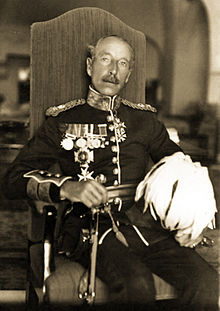| Sir Arthur Wauchope | |
|---|---|
 Wauchope as High Commissioner in Palestine Wauchope as High Commissioner in Palestine | |
| Born | (1874-03-01)1 March 1874 Edinburgh, Scotland |
| Died | 14 September 1947(1947-09-14) (aged 73) London, England |
| Allegiance | |
| Service | |
| Years of service | 1893–1938 |
| Rank | General |
| Commands | 2 Bn Black Watch 44th (Home Counties) Division Northern Ireland District Palestine and Trans-Jordan |
| Battles / wars | Second Boer War World War I Arab revolt in Palestine |
| Awards | Knight Grand Cross of the Order of the Bath Knight Grand Cross of the Order of St Michael and St George Companion of the Order of the Indian Empire Distinguished Service Order |
| Signature | |
General Sir Arthur Grenfell Wauchope GCB GCMG CIE DSO (1 March 1874 – 14 September 1947) was a British soldier and colonial administrator.
Military career
Educated at Repton School, Wauchope was commissioned into the Argyll and Sutherland Highlanders in 1893. He transferred to the 2nd Battalion Black Watch in January 1896.
He served in the Second Boer War in South Africa from 1899, and took part in operations in Cape Colony, south of Orange River. British forces advancing north from the Cape to relieve the town of Kimberley, which was sieged by Boer forces, met heavy resistance in the Battle of Magersfontein on 11 December 1899. Wauchope was severely wounded in the battle, and was later mentioned in despatches and appointed a Companion of the Distinguished Service Order (DSO) for his services.
In April 1902 he was seconded for a Staff appointment, as an extra Aide de camp to Sir Walter Hely-Hutchinson, Governor and Commander-in-Chief of the Cape Colony.
He served in World War I as Commanding Officer of 2 Bn Black Watch in France and Mesopotamia. After the War he joined 2nd Silesian Brigade, part of the British Upper Silesian Force, in Germany. He became Military Member of an Overseas Delegation to Australia and New Zealand in 1923 and then Chief of the British Section of the Military Inter-Allied Commission of Control for Berlin in 1924. He was appointed General Officer Commanding 44th (Home Counties) Division in 1927 and GOC Northern Ireland District in 1929.
His last appointment was as High Commissioner and Commander-in-Chief for Palestine and Trans-Jordan in 1931. Wauchope's administration was generally sympathetic to Zionist aspirations. By 1941 the former chief immigration officer for the Mandate, Albert Montefiore Hyamson, could write in his book Palestine: A Policy that "the first four years of his term were the heyday of Zionist history in Palestine." Not only did immigration go up threefold (the Jewish population increased from 174,606 to 329,358), but Jews also increased their land holdings (in 1931 they increased their land holdings by 18,585 dunams or 4,646 acres, while in 1935 they increased them by 72,905), and finally Jewish business and commerce enjoyed an economic boom. He also promoted public works and civil engineering schemes but was regarded as lax by some of his political colleagues at the early stages of the Arab rebellion. However, Wauchope oversaw mass detention throughout the revolt and sought to impose "collective punishment" on Palestinian cities and towns. This culminated in the June 1936 demolition of the Old City of Jaffa which rendered 6,000 Palestinians homeless. Wauchope retired in 1938.
-
 Wauchope with Menachem Ussishkin in Palestine, 1928
Wauchope with Menachem Ussishkin in Palestine, 1928
-
 Wauchope speaking at Kfar HaHoresh 1936
Wauchope speaking at Kfar HaHoresh 1936
References
- ^ "Sir Arthur Grenfell Wauchope". British Empire. Retrieved 11 June 2020.
- ^ "Wauchope, Arthur Grenfell". Liddell Hart Centre for Military Archives. Archived from the original on 23 September 2012. Retrieved 11 June 2020.
- "Arthur Grenfell Wauchope". Imperial War Museum. Retrieved 11 June 2020.
- "No. 27431". The London Gazette. 6 May 1902. p. 3014.
- "No. 27430". The London Gazette. 2 May 1902. p. 2937.
- Hyamson, Albert Montefiore. Palestine: A Policy Methuen, 1942, p. 147
- David Cronin, Balfour's Shadow (London: Pluto Press, 1936), p. 45–46.
- Kessler, Oren (2023). Palestine 1936: The Great Revolt and the Roots of the Middle East Conflict. Lanham MD: Rowman & Littlefield. pp. xiv, 133. ISBN 978-1-5381-4880-8.
| Military offices | ||
|---|---|---|
| Preceded bySir Henry Hodgson | GOC 44th (Home Counties) Division 1927–1929 |
Succeeded byHenry Peck |
| Preceded bySir Felix Ready | General Officer Commanding the British Army in Northern Ireland 1929–1931 |
Succeeded byEric Girdwood |
| Government offices | ||
| Preceded bySir Mark Aitchison Young (acting) | High Commissioner of Palestine High Commissioner for Trans-Jordan 1932–1937 |
Succeeded byWilliam Denis Battershill (acting) |
| Herbert Samuel (1920–1925) • Herbert Plumer (1925–1928) • Harry Luke (acting in 1928) • John Chancellor (1928–1931) • Arthur Grenfell Wauchope (1931–1938) • Harold MacMichael (1938–1944) • John Vereker (1944–1945) • Alan Cunningham (1945–1948) |
- 1874 births
- 1947 deaths
- Military personnel from Edinburgh
- British Army generals
- People educated at Repton School
- Black Watch officers
- Argyll and Sutherland Highlanders officers
- British Army personnel of the Second Boer War
- British Army personnel of World War I
- British High Commissioners of Palestine
- British military personnel of the 1936–1939 Arab revolt in Palestine
- British Christian Zionists
- Knights Grand Cross of the Order of the Bath
- Knights Grand Cross of the Order of St Michael and St George
- Companions of the Order of the Indian Empire
- Companions of the Distinguished Service Order
- Wauchope family